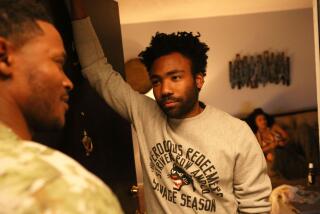TV REVIEWS : A&E;’s ‘Hoover’ Overshadowed by ‘Frontline’ Report
- Share via
The latest edition of “Biography” doesn’t make you like the Arts & Entertainment series any less, but it does make you like PBS’ “Frontline” series all the more.
Had “Biography’s” hourlong portrait, “J. Edgar Hoover” (at 5 and 9 tonight on A&E;) run before “Frontline’s” recent, shattering expose of Hoover’s life, it would stand as a perfectly serviceable record of the supreme U.S. bureaucrat and decades-long head of the FBI.
But it didn’t, and producer-director Victor Kralyevich’s conventional overview of the controversies swirling around Hoover is thus hopelessly out of the news loop.
The problem isn’t simply that little time is devoted here to the evidence of Hoover’s covert homosexual relationship with his second-in-command, Clyde Tolson, or of his cozy friendships with Mafia allies. Kralyevich and writer Alan Goldberg don’t assess how organized crime may have used this evidence against Hoover in order to neutralize any FBI effort to combat the Mob.
This, of course, was at the heart of the “Frontline” report, which also showed how the Hoover-Mob connection may have played a role in the John F. Kennedy assassination.
Kralyevich and Goldberg don’t even get near that subject, as if it would throw them off the track of their lumbering, this-happened-then-this-happened narrative. It’s enough, they think, to note that Hoover insisted that a lone gunman shot Kennedy.
Why Hoover did this, or anything else, is virtually rooted out of this story like a bad virus. The closest “J. Edgar Hoover” comes to a fresh analysis of the man’s motives is when investigative reporter Randy Shilts reflects that Hoover’s hunt for communists in the United States was an outward manifestation of his battle with his own “enemy within”--his homosexuality.
But this is a program that doesn’t do its homework, and the funny vintage clips glamorizing the FBI G-men served up here don’t make up for it.
More to Read
The complete guide to home viewing
Get Screen Gab for everything about the TV shows and streaming movies everyone’s talking about.
You may occasionally receive promotional content from the Los Angeles Times.




